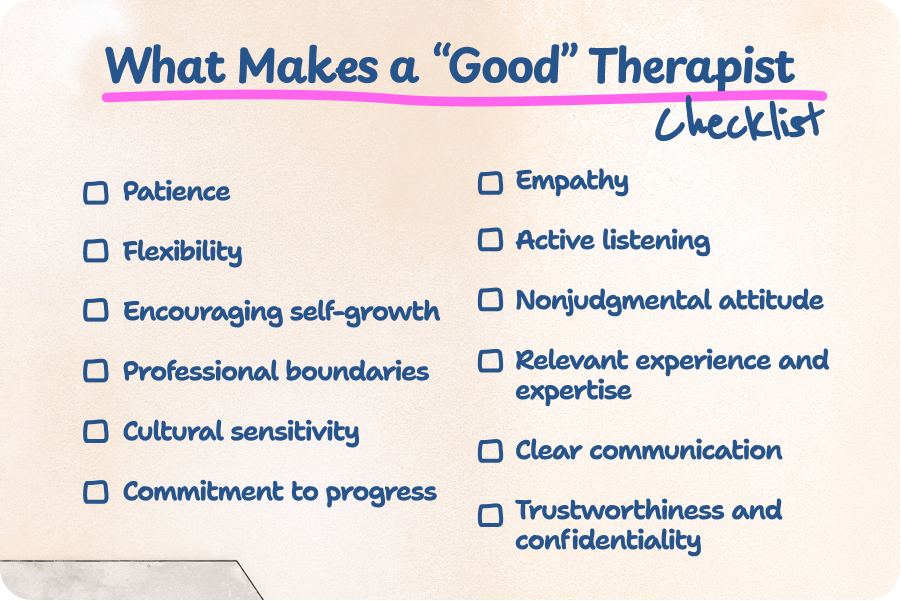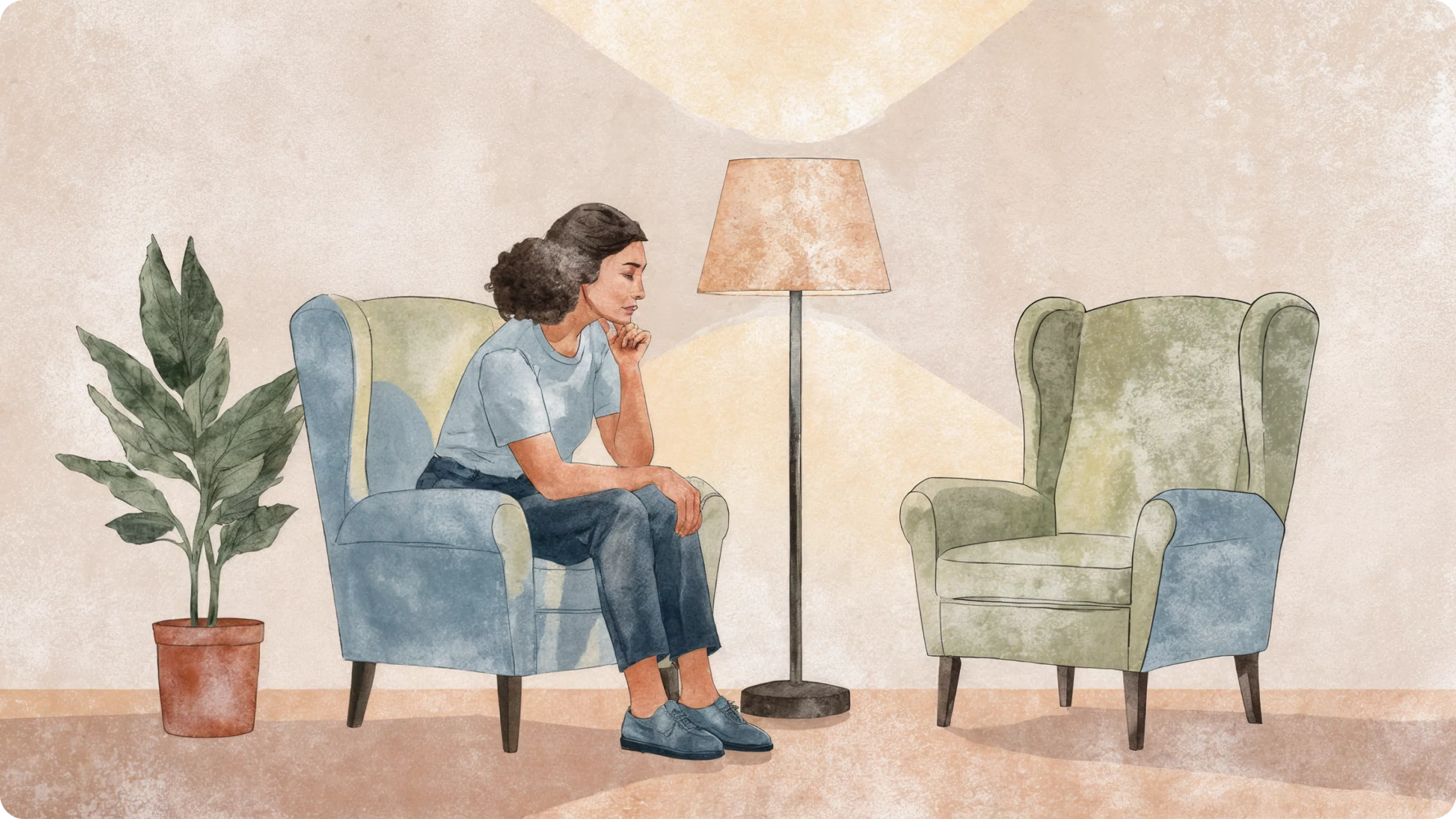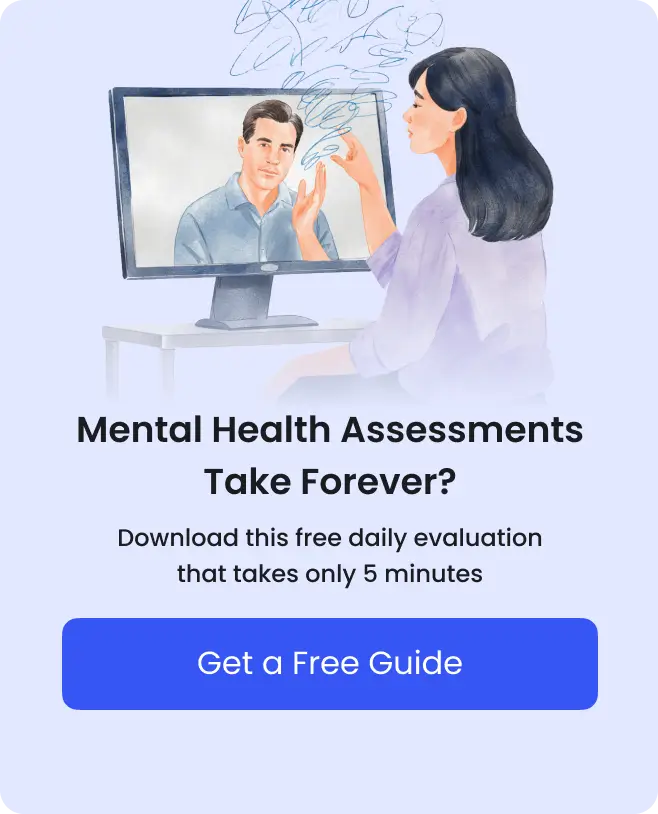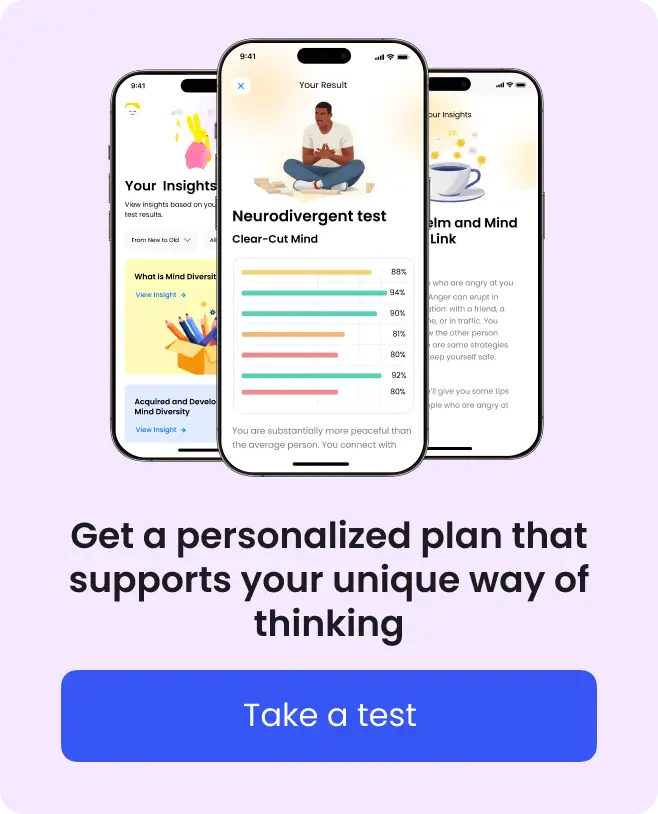As the stigma around mental health shifts, more people than ever are seeking professional help. Because of a shortage of mental health workers, people may wonder how to find a therapist. But searching for any therapist is only half of the problem. “How to find a good therapist?” is a real dilemma.
According to the latest data, there are approximately 300 thousand therapists and psychologists employed in the US. Meanwhile, the population of the US is 340 million. It’s more than a thousand potential clients per mental health professional.
We prepared a step-by-step formula on how to find a good therapist online. You will learn about common types of therapy and therapists’ specializations, and also green and red flags when vetting mental health professionals.
How Do I Know I Need Mental Health Services?
Some of the reasons why you may need counseling are crises, procrastination, emotional dysregulation, repetitive problems (also in relationships), low self-esteem, and just the desire to improve your life quality.
Mental health support is something that almost everyone will need at some point. 1 in 3 women and 1 in 5 men will experience depression in their lives [1]. And that’s not including other mental health disorders like Borderline Personality Disorder (BPD) or ADHD. It also doesn’t include having to navigate uneasy or intrusive thoughts, like What is wrong with me?
We collected some of the most common thoughts people bring to therapy below. But remember that the list is not exclusive. If your reason to get a psychologist is not in here, you still can get professional help.
Crises
Crises are overwhelming changes in life, e.g, divorce, job loss, graduation, death of a loved one, financial struggles, moving, etc. They can lead to any of the following:
- Feelings of uncertainty and fear of the future.
- Feeling stuck in the circumstances.
- Hopelessness.
- Questioning your identity and the meaning of existence.
- Overwhelm and negative intrusive thoughts.
Negative Past Experiences
- Childhood trauma (emotional/physical abuse, neglect).
- Relationships with a narcissistic/abusive person.
- Household dysfunction, such as emotionally immature parents, divorce, substance abuse, a history of incarceration.
- Surviving natural disasters, wars, etc.
Negative Feelings, Including about Yourself
- Low self-esteem.
- Dangerous or concerning coping mechanisms, such as substance use, self-harm, reckless driving.
- Misanthropy.
- Feelings of inadequacy, failure.
- Feeling like everything moves past you.
Procrastination
Procrastination is a process of unwillingly postponing tasks despite negative consequences and genuine desires to do them.
- As a symptom of other mental health disorders, such as ADHD, anxiety, and depression.
- Setting unrealistic standards that demotivate.
- Inability to get rid of distractions.
- Poor time management.
- Lack of motivation.
Emotional Dysregulation
Emotional dysregulation happens when certain emotions or all emotions feel unbearable or unmanageable. For example, you may struggle with:
- Persistent feelings of anger, anxiety, sadness, irritation that get in the way of a routine.
- Anhedonia. Not being able to feel happiness, even from the things that used to bring joy.
- Emotional numbness, not feeling anything.
- Crying easily or “without a reason.”
Problems in Romantic, Friendly, Family, Work Relationships
- Having repetitive conflicts.
- Inability to communicate without arguments.
- Feeling like you are misunderstood, underprioritized, not respected.
- Unhealthy coping styles, such as gaslighting, silent treatment, coercion, debasement on both sides.
Unexplained or Complicated Physical Symptoms
- Fatigue.
- Chronic headaches.
- Stomach issues.
- Not feeling rested after sleep.
- Hair loss.
- Shortness of breath.
Desire to Improve Life Quality
- Achieve goals more effectively.
- Build strong relationships.
- Setting boundaries without feeling guilty.
- Get rid of “Why am I not interested in anything?” thoughts.
- Become more creative.
- Climb the career ladder.
- Learn to enjoy the moment.
Tip: If you’re still unsure whether you should try therapy, imagine one of your loved ones with the same problems/thoughts that you have. Would you want them to get better? Do you feel like getting a counselor would help them? Most people are more compassionate towards others than towards themselves. We can use it to our advantage.
Finding a (Good) Therapist in 9 Steps
The exact steps of finding the right therapist are about knowing the answers to these questions:
- What are you seeking help with? (A list above can navigate you)
- What kind of therapist would you prefer?
- What type of therapy sounds the most appealing to you?
- When are you available?
- What is your current financial situation?
- Would you like a therapist of a specific gender, religion, race, etc?
- Where could you start looking for a good fit?
- Do you feel comfortable in the first five sessions?
- Would you like to switch and try more professionals?
Theresa Nguyen, Chief Research Officer at Mental Health America, names the process of seeking a prospective therapist a very intimate and important process [2]. In the sections below, we will help you answer each one of these questions.
Would you like to try therapy?
1. “Something just feels off.” What Do You Need Help with?
Mental health providers are equipped to help people who know that something’s not right, but don’t know what exactly. However, if you come prepared with specific goals and questions, you’d save a lot of time and at least three sessions to formulate your request.
Your request should be:
- Specific (Instead of “I’m very anxious,” say “I always prepare for the worst outcomes and never think positively”)
- Realistic (Instead of “I never want to be anxious again,” say “I want to learn to differentiate between real dangers and imagined ones”)
- Self-oriented (Instead of “I want people to treat me kinder,” say “I want to stop pleasing everyone else“)
Tip: Try journaling to write down your most common thoughts and try to group them by topic or request, e.g., “Relationships,” “Hopelessness,” or “Toxic traits.” The Breeze app has an in-built journaling feature that will always be available so that you can write down your thoughts as soon as they cross your mind.
2. “A” Therapist Doesn’t Exist. Know Different Kinds of Therapists
Mental health professionals differ a lot in their qualifications and specializations. Some therapists specialize in clinical psychology, whereas the therapeutic approaches of others are focused on self-improvement and effectiveness.
We summarized and compared common types of licensed therapists based on your request:
| Type | Qualifications & Training | Best For | Typical Limits |
| Psychiatrist | Medical doctor (MD) specialized in psychiatry; trained in medical schools for both medicine and mental health. | Different disorders requiring medication (e.g., bipolar disorder, schizophrenia, major depression). | Limited therapy time. The interventions of additional specialists, such as counselors or psychologists, are recommended to build long-term healthy coping strategies. |
| Psychotherapist | Broad category; usually holds a master’s or doctoral degree in psychology and counseling. May have experience as a clinical social worker. | General emotional dysregulation, relationships, self-esteem, stress, and trauma. | Since the category is broad, methods vary widely. Verify credentials and licensure. |
| Counselor / Therapist | Typically, a master’s degree, plus an additional license (see more under the table). Focused on short- to medium-term practical work. | Grief, family or relationship issues, stress management. | |
| Coach (Life, Wellness, ADHD, Nutrition, etc.) | Certification (not always regulated); focuses on performance, habits, and goals, not clinical issues. | Motivation, productivity, career, personal growth, and accountability. | Not trained or licensed to diagnose or treat mental illnesses. Helps to deal with trauma without therapy. |
Counselors and therapists usually hold a master’s degree, but they acquire additional licenses for a narrower practice. Sometimes this letter soup may be confusing, so we prepared a list of the most common abbreviations.
- LPC, Licensed Professional Counselor
- LMFT, Licensed Marriage and Family Therapist
- LCADAC, Licensed Clinical Alcohol & Drug Abuse Counselor
- LCSW, Licensed Clinical Social Worker
- FNP-BC, Family Nurse Practitioner Board Certified
Expert Insight
A psychiatrist is typically the best starting point if you want to pursue psychiatric medication. A psychologist or licensed therapist offers the most support around specific mental health conditions, including anxiety, depression, PTSD, and more. At the end of the day, however, fit is more important than letters, so how you feel with the provider is far more important than their specific educational background.
Nicole Arzt
Mental health professional
3. Do Your Research on Types of Therapy
Therapy is not just questions like “And how does that make you feel?” There are many different private practices and therapeutic approaches. You can find the most common ones in the table below.
| Type of Therapy | How does it work? | Best suited for | Limitations | Main Goal |
| Cognitive Behavior Therapy (CBT) | Cognitive Behavior Therapy helps identify negative thoughts and replace the cycle of negative behavior with healthier coping strategies | Cognitive therapy is best for addressing anxiety, depressive episodes, phobias, self-criticism, overthinking. It is one of the most effective treatments with a 50% rate of success in patients with depressive symptoms [3]. | May feel structured or “homework-heavy” for those needing more emotionality | To halt negative thinking patterns and build healthier coping strategies |
| Dialectical Behavior Therapy (DBT) | Combines both acceptance of willingness to change and consequences that are impossible to change | Treatment of BPD, impulsivity, emotional intensity | Requires long-term commitment and regular practice | To balance acceptance and change while reducing emotional extremes |
| Psychodynamic Therapy | Explores unconscious patterns and past experiences | Deep-rooted issues, trauma, self-understanding | Can be slow-paced and less goal-oriented | To understand how early experiences shape current behavior |
| Eye Movement Desensitization and Reprocessing (EMDR) | Reprocesses trauma through bilateral stimulation, for example, eye movements | PTSD, complex trauma, distressing memories | Needs a trained specialist, is emotionally intense | To reprocess traumatic memories so they lose emotional charge |
| Art Therapy | Helps externalize and express emotions in a safer, non-verbal way | Trauma reprocessing, reducing stress, learning to be in a moment | Cannot be a standalone therapy method. Can be ineffective for certain people, especially if clients are (sub)consciously resilient. | To facilitate emotional expression and promote healthy coping with emotional overwhelm. |
| Group Therapy | Shares a discussion in a guided group setting to cope with personal problems through mutual support | Social anxiety, grief, addiction, feeling lonely | May feel uncomfortable sharing in a group | To build connection and empathy by learning from others’ experiences |
| Social Work / Community Counseling | Practical support with mental health and daily life | Clients needing social, financial, or family-system support | Focuses less on deep emotional processing | To stabilize the environment of patients |
Note: all of these therapy types can be available both in-person and online.
4. What Can You Invest in Therapy? Your Time and Financial Opportunities
Finding a therapist is not just about what they can give. It requires effort and time from you as a client as well. It will also cost you money. Here’s how to estimate what you’re ready to invest in your therapy:
- Can you dedicate at least one hour per week to sessions?
- Can you invest an additional hour in homework?
- Can you devote at least 10 minutes daily to doing wellness activities, such as tracking your mood, journaling, meditating, etc.? All features are available in the free version of the Breeze Wellbeing app.
- Can you pay $100-$200 per session if your insurance coverage doesn’t offer emotional health insurance? Typically, therapy is most helpful when meetings are held at least once a week or every other week.
Tip: We at Breeze Wellbeing disagree that therapy should be expensive. Therefore, we offer a lot of self-exploration tools for free, such as journaling, mood trackers, mood analytics, affirmations, a routine builder, etc. It cannot replace a professional therapist, but it can provide self-efficacy.
5. Do You Have Extra Wishes for a Therapist?
It’s okay to feel like you cannot connect with just any therapist. Finding a therapist means also finding a human with whom you’ll feel comfortable discussing the most personal questions. Clients often seek this when looking for a therapist:
- Specific race.
- Religion-specific requirements (atheist, Christian, Muslim, Buddhist, etc.).
- Specific gender or non-binary.
- Trauma-informed and -trained therapists.
- LGBTQ+ therapists or LGBTQ+ affirming ones.
- Neurodivergent therapist or therapist specializing in neurodivergent questions.
Remember that it’s totally okay to have “extra” requirements for a therapist. You’re allowed to be biased, as you’re looking for someone who can deeply connect with you and your specific needs.
6. Where to Find a Therapist: 5 Ideas
Let’s say that you did your know therapy types, devoted time, know your requirements. What do you do with this knowledge? Instead of channelling your therapist search into space, you can start looking here:
- Asking friends and family. Word of mouth can be very helpful in search of a therapist because not everybody will share their positive feedback online.
- Your health insurance’s network. Every major insurance company has a network of in-person or teletherapy therapists. Visit your insurance’s website or contact them via phone/email
- Online directories for therapist search. Most therapists nowadays will be listed on platforms like Better Help, Psychology Today, Talk Space, etc. These platforms offer numerous filters like distance, individual/group therapy, request, special requirements, etc.
- Social media. Many therapists use social media to get visibility and stand out among the competition. It’s essential to check their credentials, though.
- Local groups in Reddit, Facebook, X. Many cities/neighbourhoods have groups on social media where they exchange information, sell/buy things, talk. You can ask for therapists’ recommendations there, and people will likely share their genuine feedback.
7. Interview a Potential Therapist
In a therapist search, you are an employer. You can ask everything about their credentials, treatment approaches, and skills. Reach out to a potential therapist via phone call, email, messages, or trial sessions. You may ask them:
- Where are your licenses and certifications? (You can later check them on your state’s licensing board or professional organizations)
- How many years have you been practicing?
- Do you have experience with therapy for *your request*?
- How do you keep confidentiality? Will my case be escalated to supervision?
- What are your therapy approaches?
- Are you in therapy yourself?
- How do I pay for sessions?
- What is your cancellation policy?
- How do you measure the progress of your clients?
8. Prepare for First Appointment, but Don’t Make a Final Verdict
- If meeting virtually, choose a private place where no one can hear or interrupt you.
- Set up an internet connection so that you won’t get disconnected in the middle of a session.
- Prepare your request (we described how to do it in the first step)
- Write down your thoughts during the week that you’d like to escalate to therapy.
- Plan your post-therapy activities, e.g., self-care, journaling, reading, getting a coffee.
- Give a chosen therapist up to 5 meetings to make a final decision.
It’s unlikely that you’ll feel complete relief after the first meeting and even after the first five sessions. The general idea of giving a therapist time is that first meetings are introductory, and a therapist can still look for the right approach to you.
First impressions absolutely matter, but it sometimes takes longer to understand whether this person is a good fit. Except for when you see red flags that we’ll describe a bit later.
9. Change and Repeat (If Needed)
It’s okay to change therapists. A recent survey of a thousand Millennials and Gen Z suggests that 49% of them have trouble finding a therapist. On average, participants needed to try at least two therapists before finding the right clinician [4].
Give your therapist a trial period of up to 5 sessions. If you don’t feel like they get or can help you until 3rd session, share your concerns with them. If nothing changes, share your feedback and change.
Use your experience with a previous therapist to help the new one get a better sense of you.
Expert Insight
The right therapist feels attuned to you and your needs. You have a sense of “what you’re doing” and “where you’re trying to go” with them. They pace sessions accordingly, focusing on both your comfort and pushing you just a bit further. Ideally, you enjoy your time with them and feel inspired to continue growing.
Nicole Arzt
Mental health professional
Signs You Found the Right Therapist
- You have a sense that they just get you.
- You feel lighter and relieved after sessions with them.
- You’re eager to attend the next sessions and tell them about your week.
- They respect your boundaries and don’t push you to talk about something that you don’t want to.
- They treat you as an expert on your own life.
- You feel free to bring up “uncomfortable” topics and resolve conflicts with your therapist.
- You don’t feel judged or scared.
- Your therapist is in therapy themselves.
- They ask you how they can be better for you, e.g., “Was this helpful?”
- They are organized and can explain/show you your progress.
- You yourself feel you’ve made progress.
- They send you onboarding information before the meeting, dealing with cancellation rate, their credentials, and their availability.
- You feel like they genuinely listen to you when you talk.
- They admit when certain problems are out of the scope of their skills.
- They don’t try to label or diagnose you as soon as you enter the door.
- They challenge you on your beliefs without forcing you out of your comfort zone.
In the image below, we summarized all green flags in 12 points. Save it for the next time you decide whether this therapist, social worker, or psychiatrist is your fit.

Red Flags of a Potential Therapist
- They breach confidentiality.
- They act out of the scope of their credentials, e.g., dealing with medications/diagnosis but being a counselor.
- They guarantee you certain results: make your life perfect, and do all of that in the short term.
- You feel like they don’t listen to you.
- They don’t remember essential information about you.
- They interrupt you.
- They disregard your values/questions.
- They specialize in “everything.”
- You feel ashamed or judged during meetings with them.
- You feel like you can’t share everything about your life with them.
- They are strictly opposed to either short-term or long-term therapy types.
- They don’t accept feedback.
- They change their policies frequently.
- They are not punctual.
- They feel “pushy” and may ask for too many details of the traumatic event.
- You feel overwhelmed with the amount of homework, resources, or notes they give you.
- They tell you that you don’t try “hard enough.”
- They make inappropriate comments, dealing with your appearance.
- They doubt what you’re telling them.
Remember: both green and red flags are subjective. Ethical and professional criteria are the most important things to consider when looking for a therapist. However, the signs above suggest common uncomfortable therapist encounters that can eventually impact your mental well-being.
Frequently asked questions
What if I can’t afford therapy?
One accessible option is non-profit community organizations that provide free or low-cost mental health services. If you can afford to pay at least something and need individual therapy, search platforms/clinics that provide sliding-scale payment options (prices change based on your income).
What questions should I ask before my first session?
You should ask your potential counselor or therapist about their qualifications, experiences, and therapy approaches they use. You probably would be interested in logistics questions, such as cost per session, insurance, cancellation policies, boundaries, etc. However, you can ask about anything that interests you without overstepping professional and ethical boundaries.
How do I begin seeing a therapist?
First, you need to prepare and do your research about your request, treatment needs, credentials, therapy types, etc. Second, find a therapist with the help of insurance providers, online platforms, social work organizations, referrals. Third, interview them and prepare for the first meeting.
Can I switch therapists if it’s not working?
Absolutely. First, try to give your current therapist feedback. But if you don’t feel any progress or they act unprofessionally/unethically, you can change therapists. Inform your current counselor that you stop working with them. If you want, you can let them know the reason. Most importantly, don’t feel guilty. Finding a clinician who will make perfect sense of your experiences is a demanding task.
How much does therapy cost without insurance?
Be ready to pay $100-$200 per session. In big cities, rates per consultation can exceed $250. The recommended number of meetings per month is 2-4. So, on a cash-pay basis, you should expect to pay nearly $500-$1000 per month for treatment for mental well-being.
Sources
- Age- and gender-specific prevalence of depression in latest-life – Systematic review and meta-analysis by M. Luppa, C. Sikorski, T. Luck, L. Ehreke, A. Konnopka, B. Wiese, S. Weyerer, H.-H. König, S.G. Riedel-Heller. Journal of Affective Disorders. February 2012.
- Theresa Nguyen. Mental Health America. December 2024.
- The Efficacy of Cognitive Behavioral Therapy: A Review of Meta-analyses by Stefan G Hofmann, Anu Asnaani, Imke JJ Vonk, Alice T Sawyer, Angela Fang. Cognitive Therapy and Research. February 2013.
- 2024 Mental Health Outlook: Growing Demand for Therapy Among Gen Z & Millennials. Thriving Center of Psychology. December 2023.
Disclaimer
This article is for general informative and self-discovery purposes only. It should not replace expert guidance from professionals.
Any action you take in response to the information in this article, whether directly or indirectly, is solely your responsibility and is done at your own risk. Breeze content team and its mental health experts disclaim any liability, loss, or risk, personal, professional, or otherwise, which may result from the use and/or application of any content.
Always consult your doctor or other certified health practitioner with any medical questions or concerns
Breeze articles exclusively cite trusted sources, such as academic research institutions and medical associations, including research and studies from PubMed, ResearchGate, or similar databases. Examine our subject-matter editors and editorial process to see how we verify facts and maintain the accuracy, reliability, and trustworthiness of our material.
Was this article helpful?






